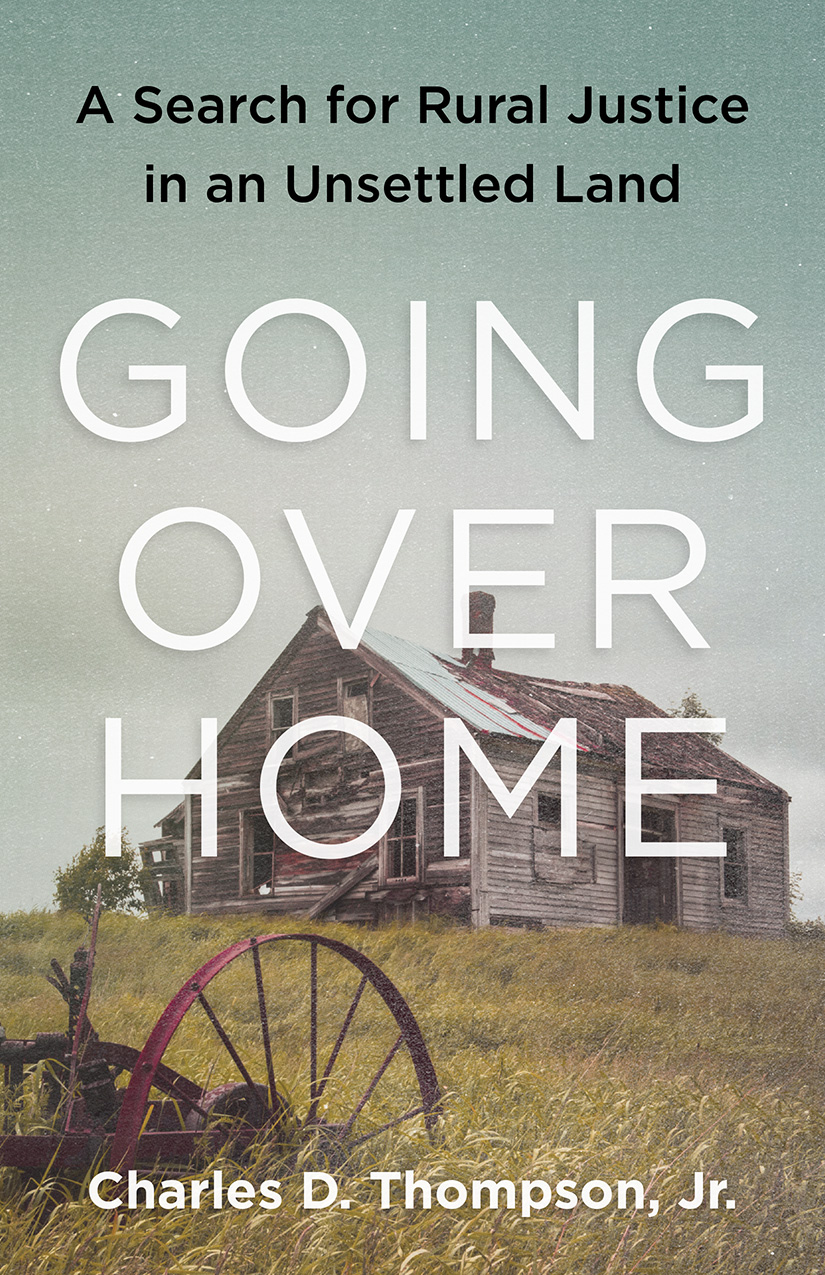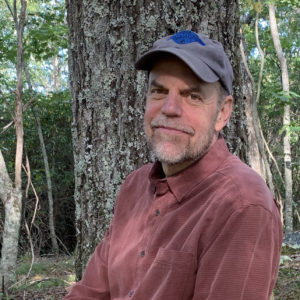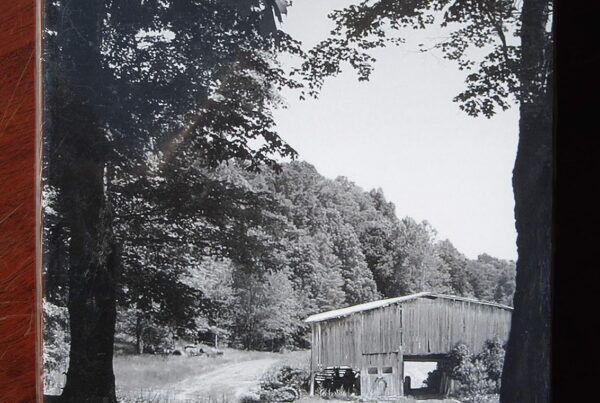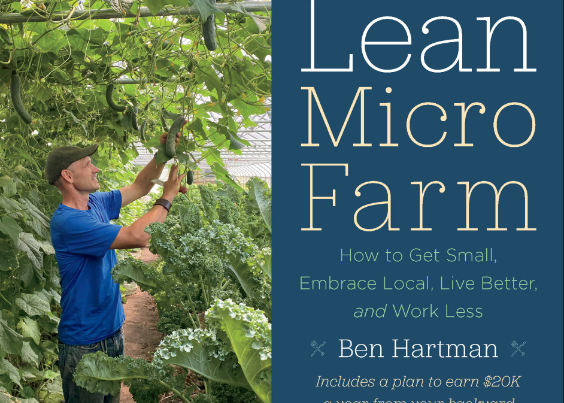
This engaging book is both a farm memoir and a discussion of racial disparities, wealth inequalities, and their effects on rural folk, mostly from 1959 to 1997, with a 2015 update. In his lifetime, Charlie witnessed the demise of every farm in his family. Working by turns as a farmer, a student, an advocate and a teacher, Charlie uncovered why small family farms have struggled so much.
The happiest parts of the author’s childhood were spent visiting his grandparents’ farms, particularly his paternal grandparents in Endicott, SW Virginia. He observed how hard they worked and how little money they earned from farming. This came into focus when he went with his grandpa to sell eight steers at auction in Roanoke. Only much later did Charlie find out how his grandpa ever managed to afford to buy land.
In 1940 there were 30 million people living on farms in the US (one-third of the population). Today it is a mere 1% of the population, and there are more people in prisons than on farms. During the 1980s American Farm Crisis, the bulk of Charlie’s parents’ generation moved off the farms to manufacturing jobs offering more pay.
In 1971, Nixon’s Secretary of Agriculture, Earl Butz, uttered the now notorious advice to farmers to “Get Big, or Get Out”. Black farmers were particularly poorly treated by the Farmers Home Administration (FmHA), which was set up to help beginning farmers and people of limited means (Black and white) get settled into farming. Black farmers were routinely turned down. In 1983, Charlie (who is white) had his own run-in when refused a loan to start Thompson Berry Farm.
In 1972, in High School, Charlie was excited to find a school greenhouse and a Hort 101 course. Most of the other Ag students were poor boys in the Vocational Agriculture program, not expected to do much academic work, but to learn farming and a manual trade, because they couldn’t earn a living solely from farming. Charlie discovered organic gardening and subscribed to Mother Earth News. He had found his tribe!
Charlie started his own garden, dreamt of a small farm. His grandpa owned some mountain land with an abandoned cabin. Charlie planned to move there, but his parents said he should finish high school and college before moving up there. Meanwhile Charlie and his cousin, as teenagers, worked on restoring the cabin, grew a garden, and enquired into the past of the place now named Woolwine Cabin. He read Thoreau’s Walden Pond, and saw through his initial romantic notions, realizing that Thoreau did not own the land he stayed on. He was a privileged guest and free to leave whenever he chose. Thoreau had access to hot meals, baths, laundry services provided by his family. The family who had lived at Woolwine Cabin had no alternative. “Deprivation, unlike simplicity, is not exactly something to celebrate.”
In 1975, Charlie went to Ferrum College, staying with his grandparents on their farm, 3 miles away. He studied art and Blue Ridge culture, and came to realize that living in the woods, growing food and making art for a living would not be enough. He needed connection with others, and to put effort into achieving justice for mountain people (and everyone). After giving thought, he applied to transfer to Emory and Henry College, whose curriculum emphasized community service. Rural justice had become more important to him than farming. This is one of several pendulum swings Charlie makes in his life between farming and doing political work for justice for farmers. He worked hard and volunteered at a campaign to prevent construction of a dam that would destroy a farming community. From there he became involved in other political action for social justice, and took a Politics of Appalachia course. He realized that Appalachian people had been exploited, victimized and then blamed for their situation. Being part of a community is not a passive act – it requires action.
The summer after graduation, he volunteered in the garden at Koinonia Farm in Georgia, a community committed to radical love of all people regardless of race. He was surrounded by poverty, and learned about the lives of former sharecroppers, who gave their lives to agriculture but owned no land to pass on to their children, and often died in debt. Even those who got “40 Acres and a Mule” couldn’t compete with the Big Ag farmers helped by USDA Price Supports. There had never been any “good old days” for most Southern farmers. Charlie’s summer garden work did not satisfy his need to reduce agricultural inequalities. But some of the other work at Koinonia addressed this directly, helping poor people afford housing (this became Habitat for Humanity). “Those who have power must be quiet and listen to those who do not have it.”
In 1979, Charlie got a job with the non-profit HEAD Corporation, organizing community gardens in the coalfields of West Virginia. But he missed farm country. He read Wendell Berry and went to a farming conference at the University of Kentucky. It was all white people. He pondered why the Back to the Land movement was divorced from the social justice cause.
The next year, Charlie got a job as garden caretaker and a member of the farmer-educator team at the Rural Advancement Fund (RAF) Graham Center – a demonstration organic farm in North Carolina, close to the South Carolina border. RAF advocated for racial justice. He worked there for a year and met his future wife Hope Shand. But focusing on organic farming failed to address the farm emergency around them, so they decided to fight the root causes of farm loss rather than teach organic methods. Farm loans to Black farmers were fewer and smaller than those to white farmers. Farmers “needed more help on how to raise hell than how to raise tomatoes.”
In 1982, Charlie applied to do a Master’s degree at the North Carolina Agricultural and Technical State University (a historically Black college) in Greensboro. NC A&T is an 1890 School (it got Federal support from the second Morrill Act to establish a “separate but equal” land grant university for people of color.) The 1954 Brown vs Board of Education declared this division was far from equal, and NC A&T was relabeled as the school for small farms, while NCSU was relabeled as for commercial farmers, rather than for white farmers. Inequality and segregation continued.
Charlie saw no other white people on campus. He found he was eligible for a full scholarship through the Federal Minority Presence Grant! Clearly the scholarship money was another form of white privilege, but Charlie reckoned that his contribution of a year as a volunteer with RAF made it fairer. And that the money would just sit there if he didn’t take it. He committed to two years of agricultural research there, becoming the horticulture teacher-in-training at Pittsboro’s Northwood High School. He questions his effectiveness as a teacher, but he learned a lot, and was conveniently near Hope, who worked fulltime for RAF, now in Pittsboro.
Charlie learned about Black land loss, in particular the problem of heirs’ property. When African American farm owners died without making a will, it has to be sold unless all the heirs agree to keep the land in the family. It usually ends up outside the family, often with a white farmer or a developer. During the Great Migration (1916-1970), young Black Southerners moved to northern cities. Some became unfindable, most had little interest in farmland. Charlie learned more about farm loss when he got a side job as a driver for Betty Bailey, the leader of the Farm Survival Project at RAF (she had a broken arm). She had started a Farm Crisis Hotline which got all kinds of calls, from those seeking information to those contemplating suicide or murder.
After graduating from NC A&T, Charlie got a job with RAF as a rural educator, and helped staff the Hotline, as well as visiting farmers, helping train them to support one another as farmer advocates. Unfair laws and credit policies encouraged farmers to go too deeply into debt. He started facilitating local meetings for women and men of all races to unite. Loan officers doled out loans in installments (“supervised loans”) to Black farmers, but deposited the complete loan upfront into the bank accounts of white farmers. Charlie hoped to unite the diverse farmers on common issues, but for Black farmers, the issue of racism was paramount. How to convince white farmers of the importance of dismantling racism? He had some success with this and with getting some of the leadership roles filled by women farmers.
In 1983, Charlie helped start the United Farmers Organization (UFO), a multi-racial, multi-gender farmer group. UFO called for a moratorium on all FmHA farm foreclosures nationwide (because of the inequities). Congress supported the call and prevented foreclosures for two years. This involved attending a lot of meetings. Some white farmers worried that their political activity might jeopardize their farm loans. Some Black farmers wanted faster change and refocused on saving Black land. UFO disbanded. In 2010 (under the Obama administration) payments were finally made to 34,000 African American farmers who had waited 25 years.
In 1984, the author continued his work advocating for and helping farmers stay on their land and making a living farming. He and his fiancée Hope applied for a Beginning Farmer loan to buy a farm. Near Pittsboro they found a 22-acre parcel of a worn-out tobacco farm with a decrepit house. The loan request was rejected by the FmHA, despite a carefully crafted farm plan. Charlie wrote a 5-page appeal, which he hand-delivered to the new county supervisor, asking for reconsideration, along with a revised 8-page plan and supporting letters from farmers and the extension agent. He got a second rejection, and appealed again, adding more allies and endorsements. He had been denied based on the opinion that his plan was “unusual” but this is not valid grounds for rejection. He went to Wake County Courthouse in Raleigh, and stressed how well-prepared he was to start farming. After another month, he got a letter reversing the decision of the county committee, but it did not guarantee that a loan would be approved if he reapplied! Charlie did reapply, this time directly to the loan officer, who admitted to the unfairness and illogicality of the previous loan decisions. He could have got a loan for a large chicken farm, even though he knew nothing about chickens! This time he got his loan. Happily, the landowner had kept faith with Charlie for over 9 months, and refrained from building a trailer park on the land.
In 1985, Charlie and Hope married and moved to the land, Whippoorwill Farm. Both still had day jobs, but Charlie was working 14 hour days, starting the farm, and selling produce at the Carrboro Farmers Market. He also helped start more farmers’ markets in the area, to meet demand, and campaigned against the large Raleigh State Market that was not a growers’ market. After his Op Ed appeared in the paper, he started receiving threatening phone calls. Meanwhile many other farms in North Carolina were still struggling to pay their bills and the moratorium on foreclosures would soon end. Poor people did not have ability to buy food at the Carrboro prices. Charlie worked to incorporate WIC vouchers as a way of paying for produce.
 Meanwhile the USDA Organic Standards allowed distant large farms to compete with small local farms, co-opting terms like family farm, natural, local as well as images of bucolic small farms. By focusing on small local organic farms, many foodies had stopped monitoring big corporate ag. RAF, now RAFI, revealed that agribusiness was merging with Big Pharma, and seed companies were bought by chemical companies. These changes squeezed out medium-sized farms, and reduced access of poor people to good food.
Meanwhile the USDA Organic Standards allowed distant large farms to compete with small local farms, co-opting terms like family farm, natural, local as well as images of bucolic small farms. By focusing on small local organic farms, many foodies had stopped monitoring big corporate ag. RAF, now RAFI, revealed that agribusiness was merging with Big Pharma, and seed companies were bought by chemical companies. These changes squeezed out medium-sized farms, and reduced access of poor people to good food.
In 1986, Charlie (now farming full-time) needed more labor to pick his fruit. He got help from some Mexicans out-of-work from a chicken factory. He learned a lot about the struggles of farmers in Mexico, and reflected on the irony of local crops harvested by global labor! He came to see his deepest devotion is to farmers, not farming. “We as a nation have become dependent upon displaced farmers from elsewhere to do our hand labor in the fields. We eat because of their losses. US agriculture depends on the displaced. Indeed, it always has.”
By 1993, he and Hope had a son, and he was missing his extended family, needing a village and not feeling grounded at the farm. He had been asking his neighbors about the history of his land. It was once worked by a family of African American sharecroppers, who said the Black family before them lost the farm to crop failures and debt. Charlie realized he was working land where a silent racial clearance had taken place. He also found native American projectile points (“arrow heads”).
After seven years at Whippoorwill, he was rethinking farming, and wanted to pivot towards learning more, writing and making films. He wanted to amplify the voices of rural people, especially those forced to leave their land. He got a place at the University of North Carolina at Chapel Hill in the Religion and Culture program, and decided to sell the farm.
His second focus was to try to understand his family’s agricultural heritage in the context of European exile, concentrating on his mother’s side. They were Old Order Brethren immigrants from Germany in the 1700s. Most German immigrants from the Palatinate region, like the author’s ancestors, were exiles from religious persecution. Few immigrants ever intended to remain working for others as humble renters or laborers. Before they could start their own farms, they had to do 4-7 years of indentured servitude. 4-7 years of making the wealthy wealthier. Thomas Jefferson mused about alternatives to slavery, considering employing landless immigrant German farmers as sharecroppers or tenant farmers. This is another ironic contradiction in Jefferson’s legacy – another unlanded people from another country to work the soil without owning the land.
In 1997, Charlie went with his grandpa to the Floyd Country Store for the weekly dance. It was to be grandpa’s last dance. During the journey, Charlie asked him how he ever made the leap from a family of poor tenant farmers to owning 150 acres and a house in 1930, as a young man. The big secret came out. He had hauled bootleg liquor in a convoy of cars to the coalfields of West Virginia. Most of the money went to the Big Wheels, but grandpa made enough for a down payment on his farm. He had not told the story for 70 years. It was not the American Dream that provided. It was ingenuity and risk-taking in an illegal business. Charlie fit this piece with other stories of hardship and making ends meet, and even wrote a book about moonshine.
In 2015, the author joined the National Association for the Advancement of Colored People (NAACP) “Moral Mondays” to call on elected leaders to do right by poor marginalized people. He and Hope got arrested, following a quote from Thoreau “If . . . the machine of government . . . be of such a nature that it requires you to be the agent of injustice to another, then, I say, break the law.” They knew they were not risking as much as the Black people whose jobs were on the line.
Charlie’s positivity about rural America has taken a beating, especially since 2016. We have been told that “rural America” voted for Trump hoping straight whites could rise again and blame troubles on everyone else. Fear won the day. Equality and participatory democracy are seen as problems rather than cherished ideals. Welcoming immigrants and caring for the environment are seen as weakness.
Will farm communities survive? Inequality will get worse if we are idle. We must push back against intolerance and join the oppressed in their fight for justice. We need to acknowledge that the loss of good jobs is real, coal and factory towns have suffered great harm, farm communities have been shredded. Hurt people sometimes lash out. We need to understand the roots of rural discontent, reflect back people’s fears in constructive ways. We must love our neighbors (the neighbors we have, not only those we choose), and plant seeds of hope and change for the next generation.
Book Review: Going Over Home: A Search for Rural Justice in an Unsettled Land, by Charles Thompson, Chelsea Green Publishers, September 2019. 243 pages, 33 photos, $18.






